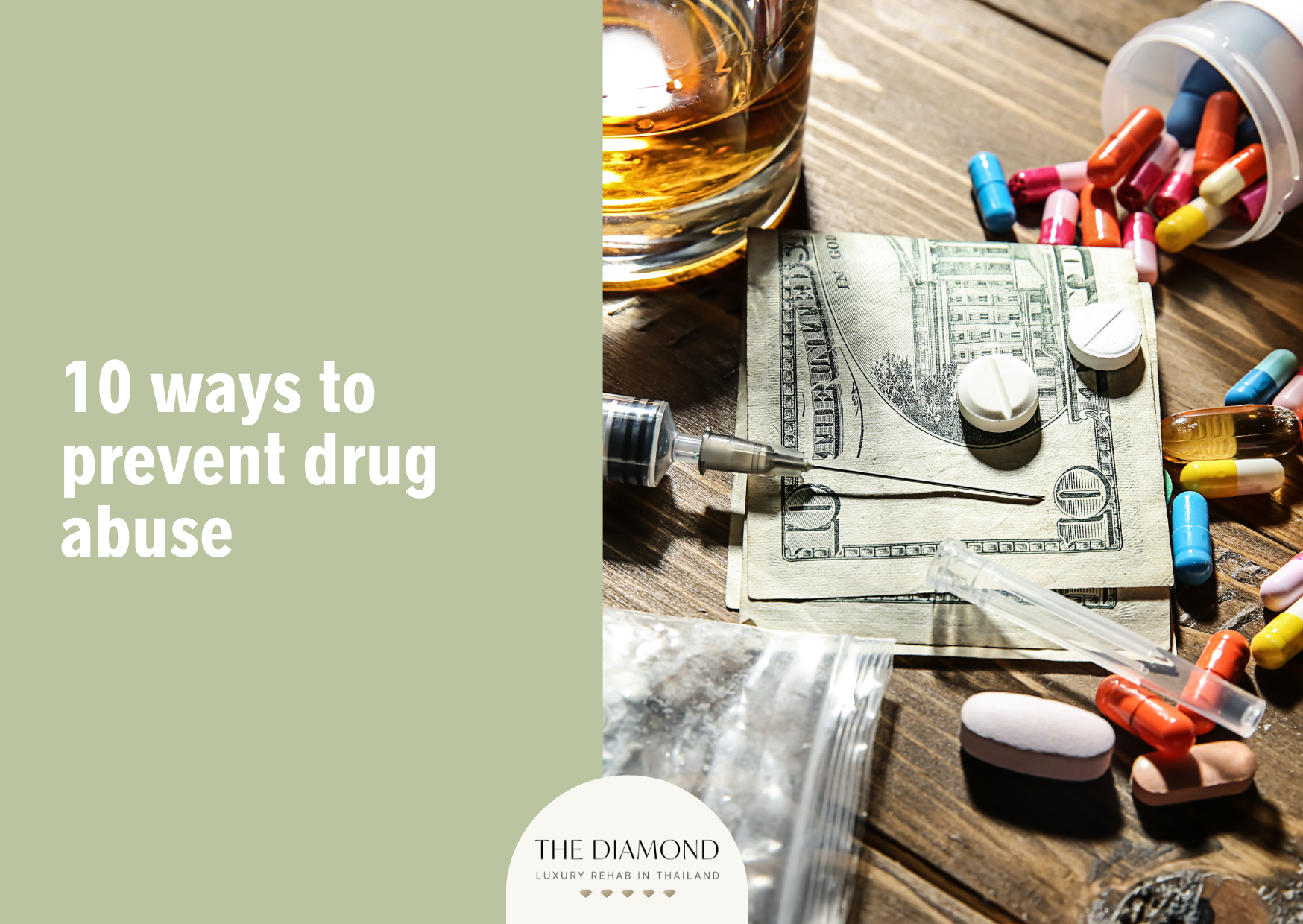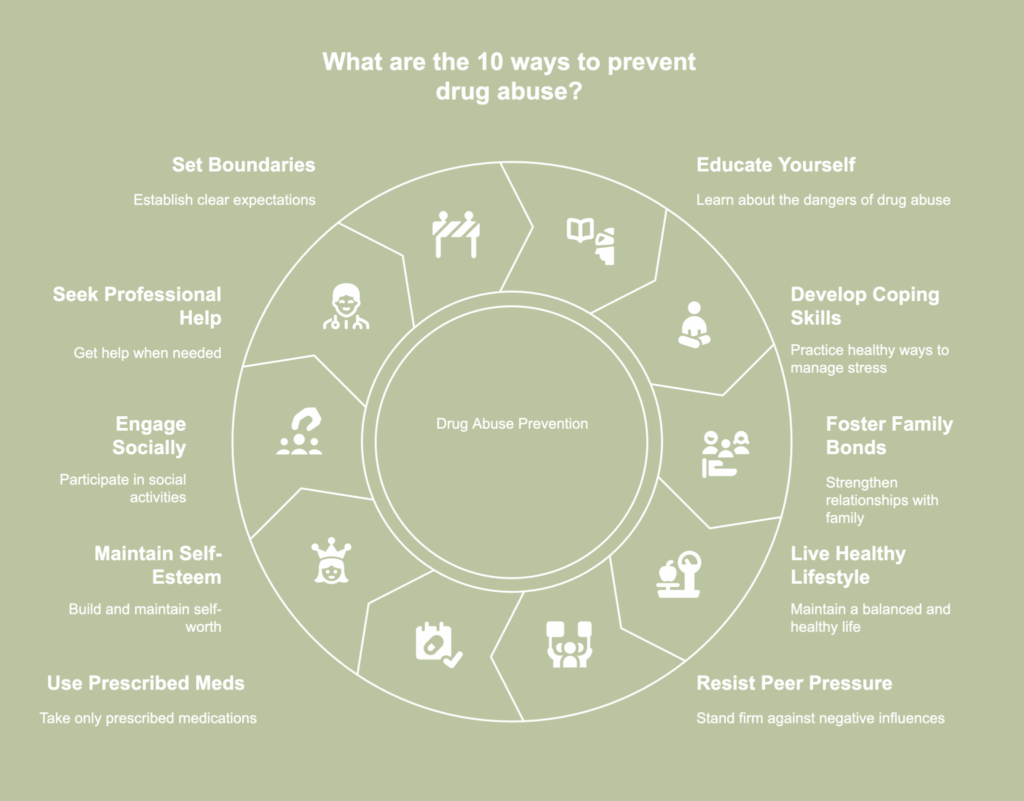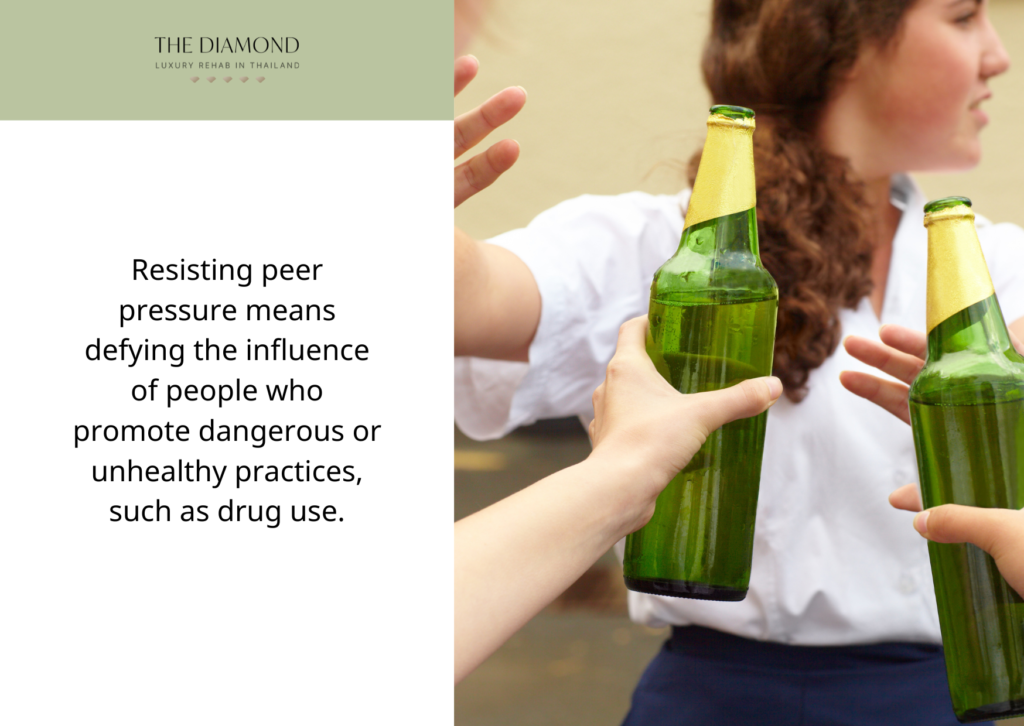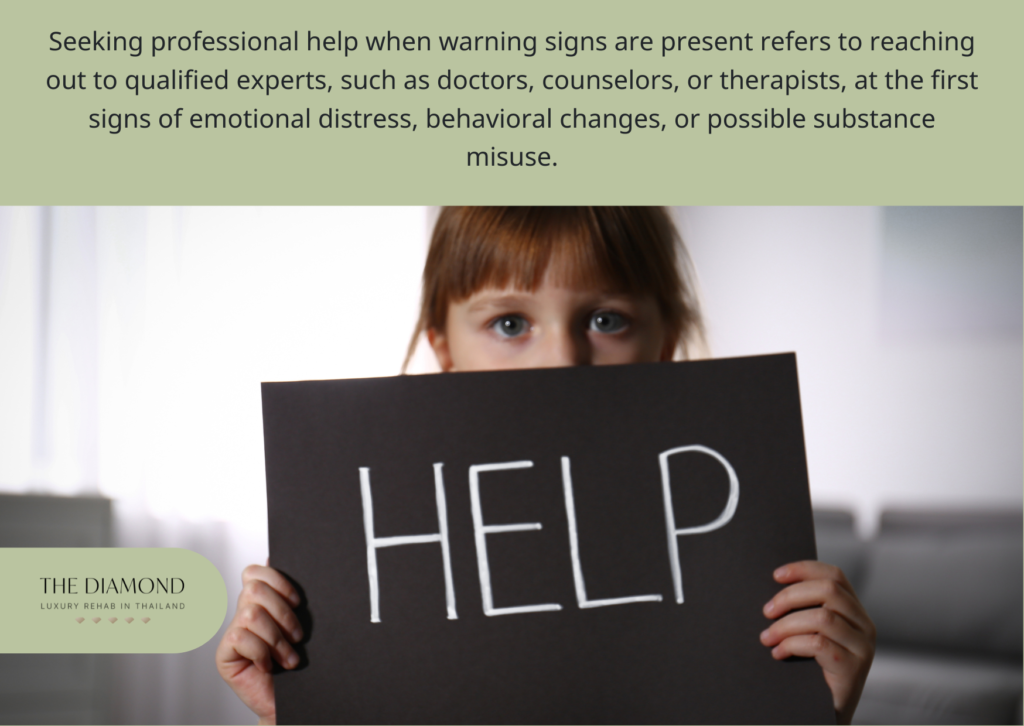10 ways to prevent drug abuse
Table of content
- What is drug abuse prevention?
- What are the 10 ways to prevent drug abuse?
- 1. Educate yourself on the dangers of drug abuse
- 2. Learn and practice healthy coping skills
- 3. Foster strong family relationships
- 4. Live a healthy, balanced lifestyle
- 5. Resist peer pressure
- 6. Take only prescribed medication
- 7. Maintain self-esteem and purpose
- 8. Take part in social activities
- 9. Seek professional help when warning signs are present
- 10. Set clear expectations and boundaries regarding substance use

Drug abuse prevention describes initiatives put in place to prevent or lessen the onset and spread of drug use among people and communities. As a way to stop addiction from developing, strategies try to inform people about the dangers of substance abuse and encourage better choices.
The 10 ways to prevent drug abuse are to educate yourself on the dangers of drug abuse, learn and practice healthy coping skills, foster strong family relationships, live a healthy, balanced lifestyle, resist peer pressure, take only prescribed medication, maintain self-esteem and purpose, take part in social activities, seek professional help when warning signs are present and set clear expectations and boundaries regarding substance use.
What is drug abuse prevention?
Drug abuse prevention is a structured process built to reduce exposure to risk factors tied to early drug use. A clear framework guides programs toward stronger support systems for families across diverse communities.
Educational messages paired with routine monitoring further create protective conditions promoting long-term prevention goals. Public initiatives encourage constructive choices before patterns of drug use intensify.
In many regions, drug abuse trends decline once substance abuse prevention efforts secure strong community support. Tailored outreach introduces age-appropriate material for families seeking firm direction through early challenges.
Collaborative planning promotes unified action across multiple communities to reinforce wide-scale health safeguards. Preventing substance abuse remains central to every model because sustained efforts secure better futures for younger groups.
What are the 10 ways to prevent drug abuse?

10 ways to prevent drug abuse refer to a list of doable tactics or approaches meant to lessen the probability of drug usage. The 10 ways to prevent drug abuse are listed below.
- Educate yourself on the dangers of drug abuse
- Learn and practice healthy coping skills
- Foster strong family relationships
- Live a healthy, balanced lifestyle
- Resist peer pressure
- Take only prescribed medication
- Maintain self-esteem and purpose
- Take part in social activities
- Seek professional help when warning signs are present
- Set clear expectations and boundaries regarding substance use
1. Educate yourself on the dangers of drug abuse
Educating yourself on the dangers of drug abuse refers to building a clear understanding of how substance misuse threatens personal health and daily stability. The focus points toward learning about illegal drugs along with harmful effects touching the body and mind.
A steady learning process grows through trusted medical guidance, expert commentary and community health resources offering practical explanations of substance reactions. Gradual expansion of knowledge supports stronger judgment during encounters in high-risk environments.
Early awareness plays a central role in substance abuse prevention because informed individuals develop sharper instincts about repercussions tied to illegal drugs. Comprehensive understanding encourages healthier choices, strengthening community safety. A well-educated approach creates a reliable path toward sustained protection from substance-related harm.
2. Learn and practice healthy coping skills
Learning and practicing healthy coping skills is the development and application of constructive techniques to manage stress, emotions and life events without resorting to negative practices including drug use.
Developing routines aiding in emotional stability, such as regular exercise, practicing mindfulness, finding solutions to problems or talking to someone you trust, is part of the process.
Coping skills work through consistent use of constructive responses when faced with pressure or emotional discomfort. Replacing harmful reactions with healthier actions reduces the urge to escape through substance use and helps individuals stay grounded during difficult moments.
Learning healthy responses lowers the pull of addiction because relief comes from honest support instead of chemicals. Strong coping tools make drug dependence less likely, since a person already holds practical ways to manage pain and disappointment.
3. Foster strong family relationships

Fostering strong family relationships refers to nurturing steady bonds built on trust and consistent support. Such connection grows from shared routines supported with open conversations. Families strengthen unity through regular check-ins helping each member feel noticed and valued.
Supportive relationships within families work by providing individuals with a stable foundation for emotional guidance and accountability. Strong family bonds reduce risks for drug abusers because warmth from home life offers grounding strength when faced with temptations.
Strong family ties are important because such bonds deter substance misuse and promote healthy behaviors. The ability to bounce back from adversity and protect oneself from harmful influences is enhanced in a supportive domestic setting.
According to a 2021 study by Hogue et al., titled “Family Involvement in Treatment and Recovery for Substance Use Disorders among Transition-Age Youth: Research Bedrocks and Opportunities,” systematic reviews and meta-analyses show family-based treatments rank among the most successful strategies available to adolescents with substance use disorder (SUD).
Such measures greatly reduce substance use by improving family skills (e.g., communication, problem-solving), relationships and contacts with outside systems.
4. Live a healthy, balanced lifestyle
Living a healthy, balanced lifestyle describes the preservation of one’s physical, mental and emotional health with everyday choices strengthening body and mind without leaning on quick fixes.
Balance and healthy routines work by fostering stability, diminishing stress and enhancing personal happiness, hence minimizing the likelihood of detrimental behaviors such as substance abuse. Small yet steady changes in habits allow a person to navigate life with fewer sharp swings in mood or energy.
Living a healthy, balanced lifestyle is important mostly in terms of the defense against harmful behaviors like drug usage. Healthy patterns lessen vulnerability to self-defeating behaviors, giving personal strength room to rise above destructive things.
According to a 2022 paper by Kim et al., titled “Healthy lifestyle status related to alcohol and food addiction risk among college students: a logistic regression analysis,” lower healthy lifestyle status shows a strong connection to elevated risks linked to alcohol addiction and food addiction, while specific lifestyle elements such as temperance and steady water intake offer protective benefits.
The study underscored the value of lifestyle-centered interventions aimed at preventing addiction across broad groups, with particular focus on self-control and consistent health management.
5. Resist peer pressure

Resisting peer pressure means standing firm against influence from friends urging risky behavior. Such resistance grows from clear values guiding personal judgment. Steady awareness of personal limits supports calm choices and strengthens confidence during unexpected challenges.
Peer pressure works through self-confidence, assertiveness and clear boundaries. People are able to remain focused on long-term objectives and refrain from activities causing harm or regret by refusing to follow unfavorable influences.
Resisting pressure plays a crucial role in substance abuse prevention because saying no to engaging in unhelpful behaviors protects a person’s overall health. In social situations, in particular, the importance of resisting peer pressure stems from the safety net established during times of vulnerability. Effective decision-making abilities and a distinct sense of self lessen the chance of caving in to peer pressure and encourage sustained dedication to a drug-free way of life.
A 2019 paper by Schuler et al., titled “Relative influence of perceived peer and family substance use on adolescent alcohol, cigarette, and marijuana use across middle and high school” yielded substantial proof suggesting adolescent use of cigarette products, alcohol and marijuana rises in relation to perceived use among best friends, older siblings and significant adults. Peak peer influence appeared across grades 6–12.
6. Take only prescribed medication
Taking only prescribed medication means using medicines exactly as directed by a licensed healthcare provider and avoiding prescription drugs not intended for personal treatment. The practice involves following proper dosages, schedules and medical instructions without sharing or misusing prescriptions.
Following prescriptions works through controlled use of medications under medical supervision, reducing the risk of dependence or unwanted side effects. Staying within medical guidelines helps prevent misuse and discourages casual or recreational drug intake.
The significance of appropriate medication use is mostly related to responsibility and safety. Strong adherence to legitimate prescriptions supports enduring wellness by steering individuals away from unregulated sources.
7. Maintain self-esteem and purpose
Maintaining self-esteem and purpose is defined as recognizing personal value and having a clear sense of direction or goals in life. Believing in one’s worth, feeling confident in abilities and staying focused on meaningful pursuits providing motivation and fulfillment are all keys to the approach.
A strong sense of self and defined goals reduce susceptibility to risky choices by encouraging careful evaluation of potential consequences. People who sustain such a mindset are more likely to select behaviors aligned with long-term well-being, lowering the appeal of substance use as an escape.
A 2020 study by Yan et al., titled “Self-Perception and Relative Increases in Substance Use Problems in Early Adulthood” revealed 19-year-olds with more negative self-perception experienced greater increases in substance-related problems, including criminal behavior and disruption of daily life, by age 27.
The findings align with earlier research showing negative self-perceptions contribute to heightened negative emotions, lower self-awareness and elevated stress, prompting self-medication.
8. Take part in social activities
Taking part in social activities refers to attending gatherings of people for the purpose of making new friends, having fun and nurturing existing connections. Such involvement brings people together through interaction offering connection and support.
Participation develops through friendly conversations, cooperative projects or hobbies drawing individuals into steady engagement. Group settings introduce structure through planned events, giving participants regular moments for bonding.
Strong social engagement lowers substance risks because companionship offers relief without harmful routes. Supportive circles help individuals avoid isolation by filling time with uplifting routines linked to community trust. Each prevention activity gains strength when participants rely on peers who reinforce healthy choices.
9. Seek professional help when warning signs are present

Seeking professional help when warning signs are present refers to reaching out to qualified experts, such as doctors, counselors or therapists, as soon as indicators of substance misuse appear.
Early guidance offers direction before problems intensify, giving a person timely support. Progress begins through honest conversation, allowing specialists to identify sources of stress and outline practical steps toward early prevention.
The approach works through timely intervention as professionals assess the problem, provide accurate information and develop customized recovery or preventative strategies. Addressing concerns early minimizes the possibility of negative patterns developing and promotes healthy ways of coping.
The significance of obtaining expert assistance at an early stage is the potential to avert the development of more severe issues. A person’s capacity to remain sober and avoid relapse is enhanced by the availability of timely support.
10. Set clear expectations and boundaries regarding substance use
Setting clear expectations and boundaries regarding substance use is the process of communicating specific guidelines about acceptable behavior surrounding harmful substances and the consequences of crossing limits.
Limits communicate standards, consequences and values clearly, helping individuals understand what behaviors are supported or discouraged. The approach works by consistently reinforcing standards through discussion and addressing breaches promptly to maintain accountability.
Strong boundaries help individuals avoid addiction because firm direction leaves little room for uncertain decisions during stressful periods. When rules are well-defined and consistently applied, individuals are more likely to respect limits and resist pressure to engage in risky behaviors. Families and communities gain a sense of security once everyone understands expectations about substance-related conduct.

